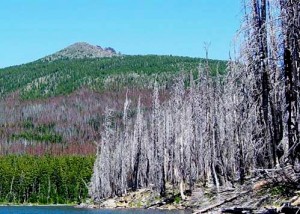Of Arrogance and Mountain Pine Bark Beetles

We oft hear from those who doubt the climate is changing or the world is older than a mere six thousand years that it is arrogant to presume that we mere humans could possibly have an affect upon our planet. It is, after all, a big place that has experienced many changes down through the eons, and the thought that we could "destroy" it, or make uninhabitable to humans, is generally unfathomable. Fathom this, climate change and pine bark beetles...
For the past (at least) twenty-five thousand years the High Desert forest lands of Southern Cascadia, the Great Basin and pine-clad slopes of the Rocky Mountains have regenerated themselves through a cyclical series of weeds, bugs and fire. Fire is necessary to open the seed cones of the predominant species here, the Ponderosa Pine (Pinus ponderosa), and the fuels for those necessary fires are predominantly Lodgepole Pine (Pinus contorta). Lodgepole pines - named for the teepee 'lodgepoles' First Americans used them for - are a weed tree of no commercial value and invariably the first species to recover from a fire or volcanic eruption. After a fire or volcanic eruption they rapidly over-run the terrain, growing in stands thick enough that these stands become resource 'stressed', leaving them open to attack by the voracious Western (or Mountain) Pine Bark Beetles (Dendroctonus ponderosae). The pine bark beetles kill off the weaken and older trees, which then burn and release seeds for the next generation.
There are 750,000 squares miles (an area greater than the state of Washington) of dead standing Lodgepole pine across what is known as The Pacific Northwest. A firestorm waiting to happen, a fire that could burn from Mount Shasta (California) to Southern Alaska.
How did this happen? Man. Or more accurately, White Man. White Man put out the naturally occurring lightning fires or those the First Americans who groomed these hills for thousands of years started. And kept putting the fires out. And the Lodgepole thrived. Until now.
Now reaching the end of their 80-100 year lifespans, a report earlier this month out of Oregon State University predicts that due to climate change - whomever or whatever is responsible - that due to the two degree increase in ambient temperatures across Cascadia the Lodgepole pine are not going to come back. Richard Waring, professor emeritus of tree physiology, and co-author of the study, said that "warmer temperatures are eliminating the spring frost that keep other trees from competing with the Lodgepole, thereby creating more welcome conditions for the beetles." The study estimates that by 2080 the Lodgepole pine will remain on less than 6,000 square miles, about seventeen percent of today's range, and most of that in British Colombia. We, Man, broke the fire cycle necessary to the regeneration of the High Desert Ponderosa forests. If the Lodgepole pine doesn't come back, neither will the Ponderosa.
But wait, it gets better... Having exhausted the food supply here on the lower elevations (3 - 4,000 feet above sea level), and so thoroughly enjoying the milder climate their breeding cycle has gone from every two years to twice a year, the Mountain Pine Bark Beetle is moving to the higher elevations and attacking a species unique to Cascadia, unique to The Pacific Northwest - the Whitebark Pine (Pinus albicaulis).
Don't tell me it is arrogant to presume that we mere humans could have an affect upon our planet. I've watched it happen.



